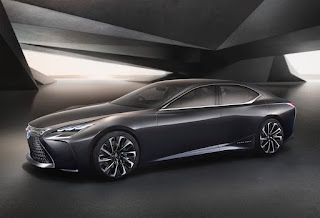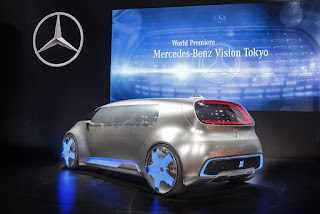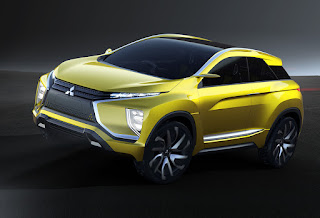The Tokyo Motor Show is an opportunity for Japanese manufacturers to reveal their latest production-ready and concept vehicles. Below is a summary of the vehicles which have sustainability in mind, with some noticeable introductions of 'Vehicle to Home' (V2H) energy systems. Amongst other applications, these can provide short-term emergency power - something Japan is very sensitive to, following the 2011 tsunami and Fukushima disaster.
Honda Clarity FCV
Honda's investment in hydrogen energy continues, with the Clarity saloon, the first to incorporate the entire fuel-cell powertrain in the space normally occupied by the engine and transmission. It has a cruising range of 700km, and the Japanese version of the model can act as a mobile power plant, with an external power feeding inverter.
Lexus LF-FC
Lexus have introduced the Lexus LF-FC, a fuel-cell powered flagship concept. Here are the details of the powertrain:
"At the heart of the LF-FC is a high output fuel cell power system that energizes the rear wheels, and also sends power to two in-wheel motors in the front, making the LF-FC all-wheel-drive. This innovative drive system allows precise torque distribution control between the front and rear wheels, giving the full-size sedan exceptional dynamic handling and superior road stability. The strategic placement of the fuel-cell stack at the rear of the vehicle, power control unit at the front and T-formation configured hydrogen fuel tanks result in front and rear weight distribution optimal for a sporty sedan."
Mercedes-Benz Tokyo Concept
Mercedes have released their 'Tokyo Concept' vehicle, aimed at 'generation Z' (those born after 1995!), living in mega-cities. 'Deep machine learning' and an intelligent Predictive Engine means it adapts to its occupants' preferences over time. It's assumed to be a hydrogen fuel-cell powertrain under its sleek body.
Mitsubishi eX
Mitsubishi are due to launch a new all-electric EV, the eX.
In the ever-increasingly competitive compact SUV market, the eX will have all-wheel drive, automated driving technologies, active safety and connected features.
An Outlander PHEV will also be demonstrated in a 'Vehicle to X' (e.g. home) setup, showing how the battery can be used to power the home.
Nissan Gripz
One of two EV concepts being introduced by Nissan at Tokyo this year is the Gripz.
An efficient gasoline engine powers the same electric motor used in the Nissan Leaf.
Nissan Teatro for Dayz
Nissan's concept car has a peculiar name, 'Teatro for Dayz', and ahead of the motor show isn't giving anything away about its powertrain, except that it's an EV. Hopefully we'll find out more soon...
Toyota FCV Plus
Hydrogen power is currently the underdog to be the dominant fuel source for mobility solutions in the future, but some manufacturers are investing huge amounts in the technology - see my recent blog to read about some examples (including the Mirai from Toyota). Toyota has now taken this one step further, and sees hydrogen cars as being an energy source to share with the community. Specifically, as well as its own hydrogen tank, it can also generate electricity from an external hydrogen source, allowing the power generated to be available at home, work, etc.
 |
| Toyota FCV Plus (2015) - in 'power sharing' mode |
Honda Clarity FCV
Honda's investment in hydrogen energy continues, with the Clarity saloon, the first to incorporate the entire fuel-cell powertrain in the space normally occupied by the engine and transmission. It has a cruising range of 700km, and the Japanese version of the model can act as a mobile power plant, with an external power feeding inverter.
 |
| Honda FCV |
Lexus LF-FC
Lexus have introduced the Lexus LF-FC, a fuel-cell powered flagship concept. Here are the details of the powertrain:
"At the heart of the LF-FC is a high output fuel cell power system that energizes the rear wheels, and also sends power to two in-wheel motors in the front, making the LF-FC all-wheel-drive. This innovative drive system allows precise torque distribution control between the front and rear wheels, giving the full-size sedan exceptional dynamic handling and superior road stability. The strategic placement of the fuel-cell stack at the rear of the vehicle, power control unit at the front and T-formation configured hydrogen fuel tanks result in front and rear weight distribution optimal for a sporty sedan."
 |
| New luxurious Lexus Concept - teaser image |
 |
| Lexus LC-FC |
Mercedes-Benz Tokyo Concept
Mercedes have released their 'Tokyo Concept' vehicle, aimed at 'generation Z' (those born after 1995!), living in mega-cities. 'Deep machine learning' and an intelligent Predictive Engine means it adapts to its occupants' preferences over time. It's assumed to be a hydrogen fuel-cell powertrain under its sleek body.
 |
| Mercedes-Benz Tokyo Concept - pre-show teaser image |
 |
| Mercedes-Benz Tokyo Concept |
 | |
|
Mitsubishi eX
Mitsubishi are due to launch a new all-electric EV, the eX.
 |
| Mitsubishi eX |
In the ever-increasingly competitive compact SUV market, the eX will have all-wheel drive, automated driving technologies, active safety and connected features.
An Outlander PHEV will also be demonstrated in a 'Vehicle to X' (e.g. home) setup, showing how the battery can be used to power the home.
Nissan Gripz
One of two EV concepts being introduced by Nissan at Tokyo this year is the Gripz.
 |
| Nissan Gripz Concept |
An efficient gasoline engine powers the same electric motor used in the Nissan Leaf.
Nissan Teatro for Dayz
Nissan's concept car has a peculiar name, 'Teatro for Dayz', and ahead of the motor show isn't giving anything away about its powertrain, except that it's an EV. Hopefully we'll find out more soon...
 |
| Nissan Teatro for Dayz |
Toyota FCV Plus
Hydrogen power is currently the underdog to be the dominant fuel source for mobility solutions in the future, but some manufacturers are investing huge amounts in the technology - see my recent blog to read about some examples (including the Mirai from Toyota). Toyota has now taken this one step further, and sees hydrogen cars as being an energy source to share with the community. Specifically, as well as its own hydrogen tank, it can also generate electricity from an external hydrogen source, allowing the power generated to be available at home, work, etc.
 |
| Toyota FCV Plus (2015) |
 |
| Toyota FCV Plus (2015) - inside |